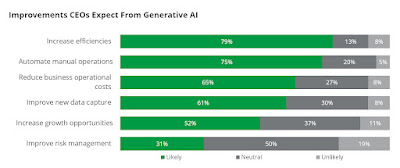The growing importance of AI as a strategic operational, financial and reputational value driver is forcing CEOs to rely more on tech savvy CIOs to take a bigger role in corporate leadership.
AI has become too great a perceived determinant of projected performance by investors, customers and employees, for CEOs, who tend to be generalists with financial backgrounds, to manage on their own now. As a result, CIOs are being given greater responsibility and authority. JL
Belle Lin reports in the Wall Street journal:
More CIOs are reporting directly to CEOs, rather than CFOs, a reflection of the role’s increased importance in helping set corporate AI strategies to keep up with competition. 63% say they report directly to their chief executives, growing from 41% in 2015 to 52% in 2023. At the same time, fewer CIOs are reporting to CFOs: falling from 26% in 2015 to 12% in 2023. The change is significant because it signals recognition of technology’s strategic importance. It underscores how AI is being led from the very top. Unlike prior waves of innovation funded by IT departments’ budgets, some CEOs and boards are earmarking funds for AI. "AI has reinforced the need to have a technology leader that understands business mission and outcomes."Artificial intelligence is pushing chief information officers closer to the corner office than ever before.
More CIOs are reporting directly to their chief executives, rather than chief financial officers, a reflection of the role’s increased importance in helping set corporate AI strategies to keep up with the competition.
CIOs have traditionally managed information-technology systems like data centers, cloud computing and business software, but must also now modernize IT and data systems to take advantage of generative AI—or even set the AI game plan. That’s giving them a bigger share of responsibility for business leadership.
“They’re putting more and more on the shoulders of that human being,” said Rob Zelinka, CIO of financial technology firm Jack Henry & Associates. “That person is probably responsible for their data strategy, their AI strategy, the technology strategy.”
About 63% of U.S.-based technology leaders surveyed by consulting firm Deloitte in February say they report directly to their chief executives. That reporting relationship has been on the rise for U.S. CIOs in recent years, growing from 41% in 2015 to 52% in 2023. At the same time, fewer CIOs are reporting to chief financial officers: falling from 26% in 2015 to 12% in 2023, Deloitte found. Deloitte is a sponsor of CIO Journal.
The change is significant, analysts and CIOs say, because it signals recognition of technology’s strategic importance. In reporting structures where CIOs report to CFOs or chief operating officers, IT is typically viewed as a cost and support function, not a profit driver.
It also underscores how generative AI is being led from the very top. Unlike prior waves of innovation that were funded by IT departments’ internal budgets, some CEOs and boards are earmarking funds just for AI.
“Interest in generative AI at the commercial leadership level has never been higher around technology,” said Lou DiLorenzo Jr., principal and national U.S. CIO program leader at Deloitte. “Being at the table allows the tech executive or CIO to basically shape that narrative.”
Corporate interest in generative AI has been surging since late 2022, when OpenAI publicly released its ChatGPT chatbot. While most enterprises are still figuring out how to apply and govern the technology, plus which vendors to work with, CIOs now have an opportunity to guide their organizations, DiLorenzo Jr. added.
The enterprises and CEOs that haven’t been investing in data management and new technologies are most likely to ask their CIO to set up an AI strategy, giving them full control over a critical piece of the business, said Martha Heller, CEO of IT executive recruiting firm Heller Search Associates.
And while technology shifts like mobile, cloud computing and software-as-a-service have similarly created opportunities for CIOs to add value, “the modern organization is heavily reliant upon all things data,” said Manu Narayan, the vice president of IT, data and operations at data-processing firm Confluent who oversees the organization’s internal data team. AI and data management are both opportunities for CIOs to set direction.
George Kurian, CEO of NetApp, said the data storage and services firm is hiring a new executive vice president, reporting to him, who will oversee the company’s AI, data management and IT, operations and supply chain, and cybersecurity.
“We saw the needs of both digital enablement and AI enablement was data becoming more sophisticated and complex,” Kurian said, “and needed an executive at the leadership table to be able to work across the different functions.”
During the pandemic, many CEOs hired or turned to CIOs for help in preparing their businesses for remote work. That, alongside ongoing technology modernization initiatives and overseeing digital tools for customers, has continued to push CIOs into the spotlight. Plus, CIOs have only been around for about four decades, so the role is naturally maturing, said Anjali Shaikh, a Deloitte managing director and U.S. CIO program experience director.
Today’s AI boom marks just the latest chapter in the role’s journey from the back office to center stage.
“Generative AI has just reinforced the need to have a technology and digital leader that understands business mission and outcomes, and how they are connected together,” said Lisa Davis, CIO of Blue Shield of California.
Davis began reporting to the health insurer’s CEO in 2022, requesting the change so she could take direct part in conversations about technology’s role in overhauling the business. While the scope of her responsibilities hasn’t changed, influence at the CEO level has led to tech modernization projects rolling out more quickly, she said.
“That would have never happened if IT was sitting in a back office,” Davis said.




















0 comments:
Post a Comment